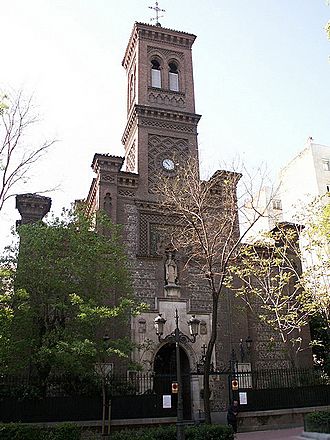San Fermín de los Navarros facts for kids
Quick facts for kids Church of San Fermín de los Navarros |
|
|---|---|
|
Iglesia de San Fermín de los Navarros
|
|
 |
|
| General information | |
| Type | Church building |
| Architectural style | Neo-Mudéjar, Gothic Revival |
| Location | Almagro, Madrid, Spain |
| Address | Paseo de Eduardo Dato, 10 |
| Coordinates | 40°25′58″N 3°41′33″W / 40.432725°N 3.692592°W |
| Construction started | 1886 |
| Completed | 1890 |
| Inaugurated | 6 July 1890 |
| Design and construction | |
| Architect | Eugenio Jiménez Corera, Carlos Velasco Peinado |
| Type: | Non-movable |
| Criteria: | Monument |
| Designated: | 20 April 1995 |
| Reference #: | RI-51-0009079 |
The Church of San Fermín de los Navarros is a beautiful church in Madrid, Spain. Its name in Spanish is Iglesia de San Fermín de los Navarros. This church is special because it honors Fermin, a saint connected to the region of Navarre.
This building replaced an older church. The first church was taken down to make space for the Bank of Spain.
Building the Church
The Church of San Fermín de los Navarros was designed by two architects. Their names were Eugenio Jiménez Corera and Carlos Velasco Peinado. They started building it in 1886. The church was finished in 1890. It officially opened its doors on July 6, 1890.
Architectural Style
The church is built mostly from brick. It combines two interesting styles of architecture. One is called Neo-Mudéjar, and the other is Gothic Revival.
- The Gothic style can be seen inside the church. It often includes tall arches and detailed decorations.
- The Neo-Mudéjar style is more visible on the outside. This style uses elements from old Spanish-Muslim art. It often features brickwork patterns and horseshoe arches.
Protecting the Church
Over the years, the church has faced some challenges. During the Spanish Civil War, which happened from 1936 to 1939, some parts of the church were damaged or lost.
However, the church is now protected. On April 20, 1995, it was officially named a Bien de Interés Cultural. This Spanish term means "Asset of Cultural Interest." It is a special title given to important historical or artistic places in Spain. This helps make sure the church is preserved for the future.
See also
 In Spanish: Iglesia de San Fermín de los Navarros para niños
In Spanish: Iglesia de San Fermín de los Navarros para niños
- Catholic Church in Spain
 | Janet Taylor Pickett |
 | Synthia Saint James |
 | Howardena Pindell |
 | Faith Ringgold |

